A Glimmer of Optimism
Maybe, just maybe, God is working in a very mysterious way.
-
If he is, he is working in a way that surprises and offends me, is that normal?
Some blogs have influenced the political world, some give harrowing accounts of life in a war zone, or an area hit by natural disaster, and others tell of the day to day struggle of living with a terminal disease. This one has a picture of a frog on a bike, somewhere.
Maybe, just maybe, God is working in a very mysterious way.
1 Cor. 1:27-29 God chose what is foolish in the world to shame the wise; GodAnd regarding his 'thorn in the flesh':
chose what is weak in the world to shame the strong; God chose what is
low and despised in the world, things that are not, to reduce to nothing
things that are, so that no one might boast in the presence of
God.
2 Cor. 12:10 for whenever I am weak, then I am strong.
Jesus, my life, it’s in your hands
Pieces, broken, mould me in your plan
Shattered dreams, selfish schemes, I leave them at your feet
Weakness, impurity, it’s your mercy that I need
Readings
Is. 53: 1-12
John 18:1-12
--------------------------
I saw the new Superman film in the summer, it wasn’t a particularly good film but it had some interesting features:
Lois Lane (played by Kate Bosworth – no relation as far as I’m aware) says:
‘The World doesn’t need a saviour’, she is proven wrong.
There is a short speech from Superman’s father which features the following line:
The Kryptonian prophecy will be at last fulfilled. The son becomes the father - the father becomes the son."
Superman is stabbed in his side with a shard of Kryptonite
Superman is on a life support machine, as good as dead, when a female nurse finds his room empty and the window open.
The ‘resurrected’ Superman flies up into space and basks in unadulterated sunlight (gamma radiation, or something like that) in a cruciform pose
It seems that the movie producers deliberately styled Superman after Jesus, we may also find ourselves styling Jesus after Superman
The idea that Jesus is like Superman has some appeal
The Messianic hope of Israel tended to be in terms of a warrior who would bring political liberation for Israel from the Romans, or whoever might have been oppressing them at the time. In fact, some scholars would argue that intrinsic to the meaning of ‘messiah’ was the idea of the nationalist liberator for Israel. The image of the suffering servant is quite foreign to this view.
Apparently, there were many self-appointed messiahs in the middle of the first century who would whip up a band of followers and then go and get themselves killed by the Romans.
It might be in relation to this that John’s Jesus reflects bitterly:
I have come in my Father's name, and you do not accept me; if another comes in his own name, you will accept him (Jn. 5:43)
Ben Kosiba (also known as Bar Kochba) was beheaded by the Romans in 135 AD after he led a major Jewish uprising. He amputated a finger (probably not a thumb as I claimed when delivering this talk) from each of his serving soldiers which suggests he was quite an impressive figure. The prominent Rabbi Akiba proclaimed him as ‘King Messiah’. He must have been pretty awesome in his time but now he’s almost completely unknown.
To some extent it seems to have appealed to John too
From today’s reading:
knowing all that was to happen to him, (Jesus seems to know everything in advance in John’s gospel.)
The same happens to a lesser extent in the other gospels.
When Jesus said to them, "I am he," they stepped back and fell to the ground.
The power that comes from a simple declaration of identity (Cf. YHWH – the one who is) seems to have blokey appeal. If Jeremy Clarkson wrote about the incident he'd probably say something like 'he just blew them away'.
[It's notable that the other gospels don't have this incident]
But there is a flipside:
Superman can be annoying, he’s too perfect, he seems smug and invulnerable, I can’t relate to him.
The same may be said of Jesus when he is portrayed as one who is in complete control
And they said, "Jesus of Nazareth." Jesus answered, "I told you that I am he".
Do we detect a petulant tone? This happens often in John, Jesus becomes argumentative and self-promoting, a less attractive personality to emulate. (Cf. 5:18ff; 7:14-30; 8:12-20; 8:23-26; 8:31-59!)
One possible explanation for this image of Jesus, in John, as one who seems to be in constant conflict with ‘the Jews’ (it needs to be remembered that John was also ethnically Jewish) is that it was written shortly after the Jewish leaders expelled the Christians from the synagogue. This left them exposed and vulnerable to brutal persecution from the Romans.
The bitterness felt by John and his community after being betrayed by the ones who they thought were their own people is reflected in John’s portrait of Jesus. (Cf. Mt. 10:21; Mk. 13:12, brother will betray brother) And judgment is implied on ‘the Jews’ for not believing Jesus’ clear and explicit message.
Two Important differences between Jesus and Superman
1. Superman is not human
One of the earliest heresies in the Church was called Docetism. According to which Jesus was not human but rather only seemed to be human. I’m not normally one to condemn heresies but this is one that we need to be aware of because it can easily creep into our thinking; I remember when I was younger I wasn’t sure whether I was allowed to think of Jesus as human.
2. Superman prevails by redemptive violence – Jesus by redemptive suffering
Jesus as the Suffering Servant
The picture of the suffering servant from Isaiah, though not necessarily intended to be about Jesus, seems to provide an appropriate picture all the same.
he had no form or majesty that we should look at him, nothing in his appearance that we should desire him.
He didn’t wear a garish blue and red outfit with his underwear on the outside (as far as we know). The gospels tell us almost nothing about Jesus’ physical appearance, presumably his image was unremarkable.
He was despised and rejected by others; a man of suffering and acquainted with infirmity
When did you last see Superman with a cold? We can be reasonably sure that Jesus, as a human being, suffered minor illnesses from time to time, just like the rest of us. And we have all heard about his suffering.
as one from whom others hide their faces he was despised, and we held him of no account.
I saw a picture of a crucifix with Jesus looking contorted and emaciated. It's an ugly image, I could barely look. I tried to upload it but blogger won't let me for some reason, I may try again later.
I found Mel Gibson’s The Passion difficult to watch, I didn’t understand much of the dialogue (due to watching it in Poland where the subtitles were in Polish, while the soundtrack was in the relevant ancient languages) perhaps this made me focus on the images more. It was a harrowing experience to see such brutality; I could hardly speak for about two hours afterwards.
Luke’s inclusion of an eclipse in the scene of the crucifixion seems to suggest that even God couldn’t watch. (Lk. 23:44)
Unlike Superman
Jesus came as a human
Weak and vulnerable as a child
I know about kryptonite but Jesus lived with constant weakness as a human being, most of the time Superman is free from kryptonite
Superman also seems to have no psychological weakness – no doubt, no fear, he seems supremely confident in all situations.
I don’t think Jesus was like that
In the Garden of Gethsemane Jesus prays earnestly, it is implied that he knows what is to come and he is not happy about it.
Luke 22:44 his sweat became like great drops of blood
Whether this is meant to be poetic or literal the message is clear. I’ve heard it said that sweating blood was known in WW1 and was seen as a sign of absolute terror.
Jesus last words
Mark 15:34-37 At three o'clock Jesus cried out with a loud voice, "Eloi, Eloi, lema sabachthani?" which means, "My God, my God, why have you forsaken me?" …
…Then Jesus gave a loud cry and breathed his last.
(A scream?)
Luke seems to be embarrassed about this and has ‘sanctified’ Jesus’ last words
Luke 23:46 Then Jesus, crying with a loud voice, said, "Father, into your hands I commend my spirit." Having said this, he breathed his last.
This is a much more serene picture, but also unrealistic I think.
It seems Jesus was left to die, cut off from the father doubting himself and in complete anguish.
As I was preparing this, it occurred to me that we can’t begin to understand how Jesus felt unless we can doubt his Messiahship. Jesus, who had known the Father’s presence in a very real way throughout his ministry, in the time of his most extreme trial suddenly felt deserted. If Jesus was not the Messiah, he might have suffered for nothing. It would be an awful thing to hang there in agony wondering whether what you were doing would have any meaning or not.
So we have this chilling vision of Jesus suffering not just physically but also mentally, doubting himself and what he thought was his mission. His last words express a feeling of abandonment possibly failure as well. Crying out in a loud voice, (screaming?) in inexpressible anguish his life ends.
We may draw comfort from the image of Jesus as one who is in control, with immense power; we can look to the risen Christ for this.
However, I find the image of Jesus as one who knew weakness, fear, and doubt, just like I know weakness, fear, and doubt, easier to relate to and also comforting. Not only can he sympathise with me but also I can sympathise with him.
I was playing Scrabble with my dad a couple of weeks ago when I had the good fortune to pick up a blank tile at the very start of the game. I couldn't quite make a seven-letter word with it so I held on to it in the hope that I would be able to use it to maximum effect before the end of the game. (If you manage to put all of your tiles down at once you get a 50pt bonus, which is a considerable advantage when the average score is about 20) Somehow, the right letters never came and I kept the blank until the last go. It seemed that chasing the impossible dream had ruined my game, even though I still won, I think.
The curious state of alienation and confusion of man in modern society is perhaps more ‘bearable’ because it is lived in common, with a multitude of distractions and escapes... (Thomas Merton, Contemplative Prayer, Darton, Longman and Todd, Lodon. 1973. p.26)
---------------------------------
I wrote that a few days ago and I don't really know where I was going with it so I'll leave it there. I often find myself in a pensive mood, self-indulgently trying to think of clever ways to express my existential crisis. (Existential crisis eh? Pretentious or what?) Phrases come to mind that might begin to express my feeling of inner emptiness combined with faint hope, and I think I should try to construct a poem, or a poetic prayer, out of them, or something. But usually, it's just one idea, and it takes a lot of work to make any more of it. But more problematically, when I come to write down such things, the mood has passed and I just don't feel the same. To attempt writing in the same vein would feel a bit false.
A similar problem occurred in a relationship. The things that bothered me about the situation never seemed to bother me so much when we were together. But in solitary moments I knew something was wrong. I never figured out how to verbalise the problem, not in any acceptable way at least, I just knew we weren't going to be happy if we stayed together.
Anyway, perhaps becuase I've found it so difficult to find much meaningful fellowship this year, the idea of living within a community has started to appeal. I don't want to be a monk or anything, but perhaps time spent at Taize, or with the Iona Community might prove instructive, or I might hate it. But besides that, I need to find a new place to live for September and I'm looking into the possibility of living on campus at a nearby theological college, where they usually have some spare rooms, or in an international student hostel (they usally have a few British students too). I'll let you know what happens.
I have an unenviable knack for alienating myself from people I care about.
Up at 4am, got a taxi at 5, checked in at 5:30 boarded the plane at 6:45 and landed in Edinburgh at 8. Reached the city centre at about 9:00.
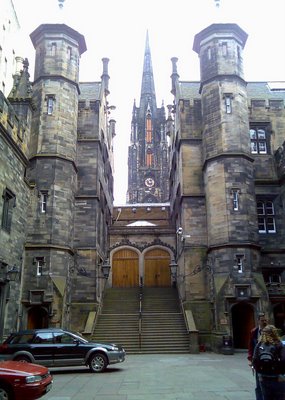
There's a new edition of the Greek NT coming out, two scholars from Muenster in Germany spoke to us about their work, new methodology, new ideas. Unfortunately, I wasn't in the best position to fully understand it but I did manage to ask a question -- Chris said it was more like an accusation, it wasn't meant to come out that way. Anyway, it's quite a privilege to have heard from scholars at the forefront of their discipline. (David Parker, one of our scholars in Birmingham is also at the forefront, he and his team are collaborating with the Germans) Particularly impressive is the digital version that will be available. If you're into that sort of thing, you can read a bit about it, and preview some of the features here: http://nestlealand.uni-muenster.de/
We finished at New college at about 4pm which left us with a few hours in which to be tourists.

Then back to the airport, on the plane at 9:30 and back into brum at 10:30. Some people got a taxi, but some of us knew the train would be cheaper, and it was. Unfortunately, there were about 1000 people on the platform. They'd been to a concert at the NEC, a Take That concert! We did manage to get onto the train when it arrived but we had to stand in close proximity all the way to New Street. Finally got home just after midnight, said hello to two of my housemates and went to bed feeling very, very tired.
Fed up of getting fat watching snooker/soaps/I'm a celebrity? Worried about climate change? Want to save money on electricity? Here the answer for you.
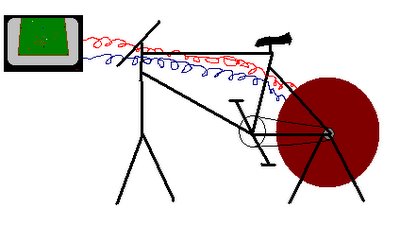
With PedalPower (R) your worries are over. This specially adapted exercise bike is connected to a large dynamo powerful and efficient enough to run your TV.
Want to know what happens? Keep pedalling!
PedalPower has low and high gears that allow you to build up momentum, skilled cyclists can produce enough power to run five TV's symultaneously.
But what if I don't want to watch TV? Then you don't have to, you can use PedalPower to run any domestic appliance, or you can plug it in to the national grid, and get paid for the power you provide. In fact, you will find that you can run your TV and feed the national grid at the same time. Yes, that's right, you can get paid to watch TV!
PedalPower is not available in the shops, for your free catalogue, send a self-addressed envelope to PedalPower Ltd., PO Box 32, Birmingham, B11 5TD
I picked up a copy of Redbrick, (the university newspaper, not a Marxist tract as my mum thought) a couple of weeks ago and was surprised to find this on page three.
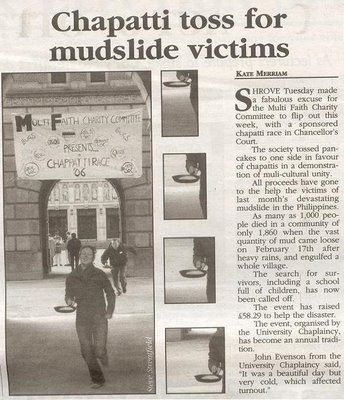
I put my car through its MOT today, it failed with flying colours. There are eight seperate faults that it failed on, some quite trivial I think, some more serious. You should just about be able to make them out below.
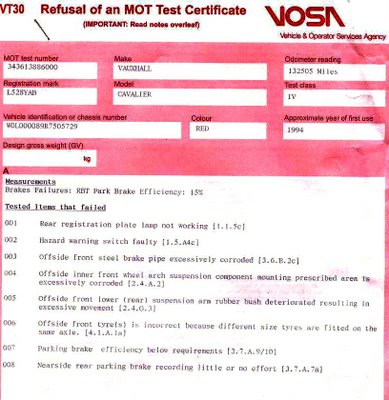
I can't help feeling that I'm still suffering the effects from when my nice car was stolen, over a year ago now.
Before we proceed with our penitential prayer, I thought it might be a good idea to remind ourselves of God’s standards
Matt. 5 21 "You have heard that it was said… 'You shall not murder'; and 'whoever murders shall be liable to judgment.' 22 But I say to you that if you are angry with a brother or sister, you will be liable to judgment...
27 "You have heard that it was said, 'You shall not commit adultery.' 28 But I say to you that everyone who looks at a woman with lust has already committed adultery with her in his heart...
38 "You have heard that it was said, 'An eye for an eye and a tooth for a tooth.' 39 But I say to you, Do not resist an evildoer. But if anyone strikes you on the right cheek, turn the other also...
43 "You have heard that it was said, 'You shall love your neighbour and hate your enemy.' 44 But I say to you, Love your enemies and pray for those who persecute you...
48Be perfect, therefore, as your heavenly Father is perfect.
-
Let’s take a few moments to consider our shortcomings before God.
When I say: Have Mercy on us, Lord
You respond with: Lord, have mercy
-
Father God,
For the times when we have been impatient, and proud, and injured others with demeaning language. And for the times when we have underestimated others and been unwilling to see the good in them, or to understand them. And for the times when we have projected our own faults on to others.
Have mercy on us, Lord
For the times when we’ve viewed others as objects and not as complete human beings. When we haven’t resisted our image driven culture and fallen into the trap of judging people by the way they look.
Have Mercy on us, LordFor those times when we have sought revenge, and to administer our own justice. When we have been judgmental and unforgiving. When we have been hurt and unwilling to let go.
Have mercy on us, Lord
And thinking about refugees, for the times when we haven’t loved our neighbours, when we haven’t given the help we were capable of giving. When we haven’t made the effort of making outsiders feel welcome, and when we have thought of them as a nuisance, or as parasites.
Have Mercy on us, Lord
And for the times when we have not made the effort to understand those whom we find difficult, and those who oppose us, and we have failed to be a blessing to them.
Have Mercy on us, Lord
And now as we go forward, let our confessions turn to repentance, and let us be perfected in your love and your glory.
Amen
I had an interesting dream this morning.
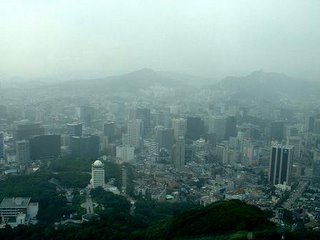 [A typical summer's day over Seoul]
[A typical summer's day over Seoul]
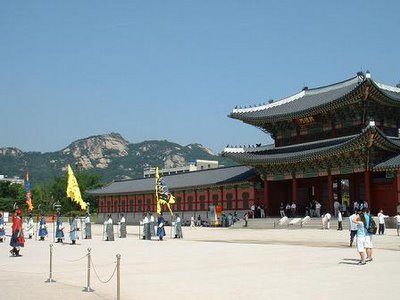 as not a completely peaceful time though; it became a vassal state to China in 1644. In 1904-5, the Japanese conquered Korea and in 1910 annexed the country. There they remained crushing resistance until the end of the Second World War. With Japan defeated after the war, America and Russia divided Korea, with the Americans ruling the south and the Russians the North. The Russian influence lives on in the North through Communist rule. (The American influence lives on in the South through McDonalds) In 1948, the Republic of South Korea was created, (it was an authoritarian regime) while the North became an independent communist state. In 1950, North Korea invaded the South; this was the beginning of the Korean War. Each side (or each leader) wanted to rule over a united Korea. America with UN backing entered the fray on the side of the South; meanwhile, China unofficially assisted the North. Stalemate resulted and in 1953 came an armistice and the establishment of the de-militarised zone between the two countries. There are still American soldiers in South Korea; I saw many.
as not a completely peaceful time though; it became a vassal state to China in 1644. In 1904-5, the Japanese conquered Korea and in 1910 annexed the country. There they remained crushing resistance until the end of the Second World War. With Japan defeated after the war, America and Russia divided Korea, with the Americans ruling the south and the Russians the North. The Russian influence lives on in the North through Communist rule. (The American influence lives on in the South through McDonalds) In 1948, the Republic of South Korea was created, (it was an authoritarian regime) while the North became an independent communist state. In 1950, North Korea invaded the South; this was the beginning of the Korean War. Each side (or each leader) wanted to rule over a united Korea. America with UN backing entered the fray on the side of the South; meanwhile, China unofficially assisted the North. Stalemate resulted and in 1953 came an armistice and the establishment of the de-militarised zone between the two countries. There are still American soldiers in South Korea; I saw many.
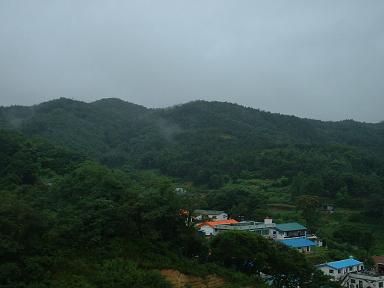 [Typica Korean Countryside, tree covered hills]
[Typica Korean Countryside, tree covered hills]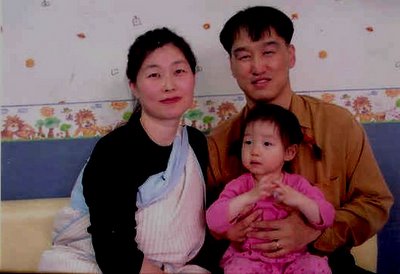
I did something very stupid yesterday. I managed to lock myself out of my computer.
Coke/Diet/CherryPepsi/Diet/MaxDr PepperSupermarket brand colaAny others I can't think of...